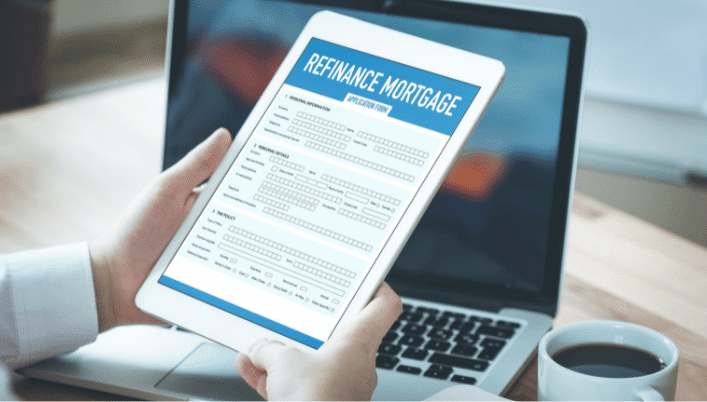
Discover the art of financial transformation through refinance calculator.
Imagine reducing burdens, optimizing opportunities, and reshaping your economic landscape.
Refinancing, a gateway to rebirth, offers fresh terms and better days.
Lower interest rates, lighter payments, and equity unlocking await.
Just as an artist refines a masterpiece, refinancing refines your financial future.
It’s a strategic dance of loan terms, credit scores, and closing costs.
Step into this world, where your economic canvas awaits your masterstroke.
Embark on a journey of financial rebirth and explore the potential of mortgage refinancing.
Key Takeaways
- Refinancing Defined: Refinancing involves replacing your existing mortgage with a new loan, often with new terms and conditions, to better manage your mortgage.
- Reasons to Refinance: People refinance to secure lower interest rates, reduce monthly payments, access cash through cash-out refinance, switch from adjustable-rate to fixed-rate mortgage, or consolidate debt.
- Types of Refinancing: Cash-out refinance offers extra funds; rate and term refinance adjusts interest rate or term; streamline refinance simplifies the process.
- Benefits of Lower Payments: Refinancing can lower monthly payments by securing a lower interest rate or extending the loan term.
- Benefits of Refinancing: Potential benefits include lower interest rates, reduced monthly payments, access to extra funds, and stability through fixed-rate mortgages.
- Lowering Interest Rate: Refinancing can help secure a lower interest rate based on market conditions and your creditworthiness.
- Refinance Calculator: A refinance calculator assesses the financial impact of refinancing by estimating new monthly payments, interest savings, and break-even point.
- Calculator Information: To use a refinance calculator, you’ll need current loan balance, interest rate, remaining loan term, and estimated closing costs.
- Comparing Loan Options: A refinance calculator aids in comparing loans by evaluating monthly payments and total interest savings for different options.
- Factors to Consider: Consider current interest rates, closing costs, loan term impact, lender reputation, and the role of the lender in the refinancing process.
Introduction to Refinancing: Understanding the Basics

What is refinancing?
Refinancing is obtaining a new loan to replace your existing mortgage.
This new loan is used to pay off your current loan, and it usually comes with new terms and conditions, including a new interest rate, loan term, and monthly payment.
Refinancing allows homeowners to take advantage of changes in the market and their financial situation to manage their mortgages better.
Why do people refinance their mortgages?
People choose to refinance their mortgages for various reasons.
The most common causes include:
- Getting a lower interest rate.
- Reducing monthly payments.
- Accessing additional funds through a cash-out refinance.
- Changing from an adjustable to a fixed-rate mortgage.
- Consolidating debt.
Refinancing can help borrowers save money, improve their financial situation, or achieve specific goals.
What are the different types of refinancing options?
There are several types of refinancing options available, depending on your specific goals and financial situation:
- Cash-out refinance: Allows homeowners to borrow against their home’s equity and receive the difference in cash when refinancing.
- Rate and term refinance: This involves changing the interest rate and loan term without taking out additional funds.
- Streamline refinance: Typically offered by government-backed loans, this option allows borrowers to refinance with reduced documentation and qualification requirements.
Exploring the Benefits of Mortgage Refinancing

How can refinancing help lower monthly payments?
Refinancing can lower your monthly payments by securing a loan with a lower interest rate or extending the loan term.
Your monthly payment will decrease with a lower interest rate, providing more breathing room in your budget.
Similarly, extending the loan term can spread the payments over a longer period, reducing the monthly amount you must pay.
What are the potential benefits of refinancing my mortgage?
There are several potential benefits of refinancing your mortgage:
- Lower interest rates: By refinancing, you may secure a lower interest rate, saving you money over the life of the loan.
- Reduced monthly payments: With a lower interest rate or extended loan term, refinancing can lower your monthly mortgage payments.
- Access to additional funds: A cash-out refinance allows you to tap into your home’s equity and receive cash that can be used for various purposes, such as home improvements or debt consolidation.
- Switching to a fixed-rate mortgage: If you currently have an adjustable-rate mortgage, refinancing to a fixed-rate mortgage can provide stability and protect you from potential rate hikes in the future.
Can refinancing help me get a lower interest rate?
Refinancing can help you secure a lower interest rate on your mortgage.
Various factors influence interest rates, including economic conditions, affordable refinance options, inflation, and creditworthiness.
If the market conditions are favorable and you have a good credit score, you can qualify for a lower interest rate when refinancing.
How to Use a Refinance Calculator to Make Informed Decisions

What is a refinance calculator, and how does it work?
A refinance calculator is a powerful tool that helps homeowners assess the financial implications of refinancing their mortgage.
It lets you input the loan amount, current interest rate, loan term, and closing costs.
Based on this information, the calculator estimates your new monthly payment, cash-out refinance benefits, total interest savings, and the break-even point on your refinancing decision.
What information do I need to use a refinance calculator?
To use a refinance calculator, you will need the following information:
- Current loan balance
- The interest rate on your current loan
- Remaining loan term
- Estimated closing costs for refinancing
This information will allow you to get accurate estimations and make informed decisions.
How can a refinance calculator help me compare different loan options?
A refinance calculator can be beneficial when comparing different loan options.
By entering the details of each loan, including the loan amount, interest rate, competitive loan rates, and loan term, you can easily compare the monthly payments and total interest savings.
This can help you choose the most suitable option based on your financial goals and circumstances.
Factors to Consider When Refinancing Your Home Loan

What factors should I consider before refinancing my home loan?
Before refinancing your home loan, there are several factors you should consider:
- Current interest rates: Compare the current interest rates with the rate on your existing loan to determine if refinancing makes financial sense.
- Closing costs: Understand the closing costs associated with refinancing, including appraisal fees, credit card debt refinancing, loan origination fees, and other charges.
- Loan term: Consider the impact of the loan term on your overall financial situation. Extending the loan term may lower monthly payments but increase the total interest paid over the life of the loan.
- Lender reputation: Research and choose a reputable lender offering competitive rates and excellent customer service.
How does the loan term impact the overall cost of refinancing?
The loan term plays a significant role in the overall cost of refinancing.
When refinancing, you can choose a new loan term, which can be shorter or longer than the remaining term on your current loan.
A shorter time will increase the monthly payments but lead to substantial interest savings over the life of the loan.
Conversely, a longer term will lower the monthly payments but may result in paying more interest over time.
What role does the lender play in the refinancing process?
The lender plays a crucial role in the refinancing process.
Choosing the right lender is essential for securing favorable loan terms and completing the refinancing process smoothly.
Research lenders, compare their rates and fees, and read reviews to find a reputable lender with the best refinancing options.
Understanding Mortgage Payments and Their Impact on Refinancing

How do mortgage payments affect the decision to refinance?
Mortgage payments are a significant factor when considering whether to refinance.
Refinancing and getting a lower interest rate or extending the loan term can reduce your monthly mortgage payment.
This can free up funds for other purposes, credit check processes, or allow you to save more money each month.
What is mortgage insurance, and how does it affect refinancing?
Mortgage insurance is a type of insurance that protects the lender in case the borrower defaults on the loan.
If your current loan includes mortgage insurance, it’s crucial to factor in the cost of mortgage insurance when considering refinancing.
Depending on the loan-to-value ratio and other factors, mortgage insurance may still be required when refinancing.
Can I do a cash-out refinance to access additional funds?
Yes, a cash-out refinance allows homeowners to access additional funds by borrowing against their home’s equity.
This is an option to consider if you have specific financial goals, such as home improvements, credit history impact, debt consolidation, or other significant expenses.
However, it’s essential to carefully consider your financial situation and ensure that you can comfortably afford the new loan payments.
Navigating Interest Rates: Lowering Costs through Refinancing

Understanding the impact of interest rates on your mortgage
Interest rates play a crucial role in determining the overall cost of your mortgage loan.
When interest rates are high, your monthly payments increase, which can strain your budget.
On the other hand, when interest rates are low, refinancing advantages, you can save a significant amount of money over the life of your loan.
How refinancing can help you take advantage of lower interest rates
Refinancing decision-making allows you to replace your current mortgage loan with a new one with more favorable terms.
Refinancing goals when interest rates are low will enable you to secure a lower rate and reduce your monthly payments.
This can free up cash flow for other expenses or allow you to repay your mortgage sooner.
Calculating potential savings using a refinance calculator
A refinance calculator is a valuable tool that helps you estimate the potential savings of refinancing your mortgage.
It considers factors such as your current mortgage balance, loan interest calculations, the new loan amount, and the difference in interest rates.
By inputting this information, you can see how much money you could save over the life of your loan modification terms.
Analyzing Loan Terms: Adjusting Loan Amount and Duration

The importance of loan terms in the refinancing process
Loan terms, including the loan amount and duration, significantly impact your monthly payments and overall financial strategy.
When refinancing, you can adjust these terms to align with your financial goals and current situation.
Using a refinance calculator to determine the optimal loan amount
A refinance calculator allows you to experiment with different loan amounts and assess their impact on your monthly payments and home mortgage.
It will enable you to strike a balance between borrowing enough to meet your needs while minimizing the overall cost of your loan.
Exploring different loan durations and their impact on monthly payments
The duration of your loan affects both the total amount you pay over time and your monthly payments.
A refinance calculator can help you analyze the impact of different loan durations and loan term flexibility and decide on the optimal term that aligns with your financial goals.
The Role of Lenders in the Mortgage Refinancing Process
Finding a reputable refinance lender
When considering refinancing impact on payments, it’s crucial to find a reputable lender.
Look for lenders with good customer reviews, competitive rates, and transparent terms and conditions.
Utilize online resources and seek recommendations from friends and family to ensure you choose a trustworthy lender.
Understanding the loan application process for mortgage refinancing
Applying for a refinanced mortgage loan involves several steps, including providing necessary documentation, completing an application, and undergoing a credit check.
A refinance calculator can help you gather the information required and determine if you meet the lender’s eligibility criteria. Refinancing timeline and refinancing tax implications.
Key requirements and eligibility criteria for loan refinancing
Lenders have specific requirements and eligibility criteria for mortgage refinancing requirements.
These may include a good credit score, a low debt-to-income ratio, and a property value assessment.
Understanding these requirements before applying can save you time and ensure a smoother refinancing process.
The Break-Even Point: When Does Refinancing Become Beneficial?
Calculating the break-even point when refinancing your mortgage
The break-even point is when the savings from refinancing penalties offset the cost of the process.
By calculating the break-even point, you can determine how long it will take for refinancing to become financially beneficial.
A refinance calculator can help you estimate this timeframe based on various factors.
Factors to consider when determining if refinancing is worth it
While refinancing can save you money, it’s essential to consider several factors to determine if it’s worth pursuing.
These factors may include the length of time you plan to stay in your home, the closing costs associated with refinancing, and the difference in interest rates.
Using a refinancing benefits calculator to assess potential savings
A refinancing benefits calculator considers your current mortgage details, refinance approval criteria, new loan terms, and closing refinancing costs breakdown.
By inputting this information, you can assess the potential savings and determine if refinancing aligns with your financial goals.
Strategies to Maximize Savings with Mortgage Refinancing
Considering debt consolidation loans as part of your refinancing strategy
If you have multiple high-interest debts, considering debt consolidation car loans as part of your refinancing strategy can be beneficial.
Combining these debts into your mortgage can lower your overall interest rates and simplify your monthly payments.
Exploring adjustable-rate mortgages vs. fixed-rate mortgage rates
When refinancing, you can choose between an adjustable-rate mortgage (ARM) and a fixed-rate mortgage.
An ARM typically offers lower initial rates, while a fixed-rate mortgage provides stability and predictability.
By exploring these options and using a refinance calculator, you can make an informed decision that suits your financial goals.
Utilizing a loan comparison tool to find the best refinancing options
A loan comparison tool is a valuable resource that allows you to compare different refinancing options and lenders.
By inputting your loan details and desired terms, you can evaluate various offers and select the one that provides the most favorable terms and potential savings.
Exploring Different Types of Mortgage Refinancing Options
Understanding Cash-out Refinancing
Cash-out refinancing is a mortgage refinance option allowing you to borrow more than your existing mortgage balance.
This option is suitable if you need extra funds for a significant expense, such as home improvements or debt consolidation.
However, carefully considering the pros and cons of cash-out refinancing is essential.
Weighing the Pros and Cons of Rate-and-Term Refinancing
Rate-and-term refinancing involves replacing your current mortgage with a new one at a lower interest rate or a different fixed-rate loan term.
This option can help you reduce your monthly payments, shorten the loan term, or switch from an adjustable to a fixed-rate mortgage.
However, evaluating your specific financial situation and calculating the potential savings using a mortgage refinance calculator is essential.
Considering the Benefits of Streamline Refinancing
Streamline refinancing is a simplified and expedited process that allows homeowners with an existing Federal Housing Administration (FHA) loan to refinance without a full credit check or appraisal.
This option can be convenient if you want to take advantage of lower fixed interest rates or reduce your monthly payments.
However, it’s essential to understand the specific requirements and limitations of streamlining refinancing.
Planning for the Long Term: Refinancing to Stay in Your Home
Calculating Mortgage Savings for a Longer Loan Term
When refinancing your mortgage, you can choose a longer loan term.
While this can result in lower monthly payments based, it’s crucial to calculate the potential savings over the long term.
A refinance calculator can help you determine whether a longer loan term aligns with your financial goals and is a viable option for saving money on your mortgage.
Managing Monthly Payments with a Mortgage Refinance Calculator
A mortgage refinance calculator allows you to assess how changes in interest rates, loan terms, loan value, and loan amounts can impact your monthly payments and existing home loan.
By experimenting with different scenarios, you can find the optimal solution that fits your budget and helps you save money in the long run.
Anticipating Future Interest Rate Trends for Better Long-Term Planning
One of the essential factors to consider when refinancing your mortgage is the current interest rate trend.
You can decide when to refinance your mortgage by analyzing historical data and economic forecasts.
A refinance calculator can provide insights into the potential interest rate savings over time and assist you in better long-term planning.
Evaluating Credit Scores and Debt-to-Income Ratios for Refinancing
Impact of Credit History on Refinance Approval
When applying for a mortgage refinance, lenders consider your credit history essential in determining your eligibility and the interest rate you qualify for.
Maintaining a good credit score and reviewing your credit report for errors is crucial.
Improving your credit score can help you secure better refinance rates and save money on your mortgage.
Calculating Debt-to-Income Ratio for Mortgage Refinancing
In addition to credit history, lenders evaluate your debt-to-income ratio (DTI) when assessing your eligibility for a mortgage refinance.
DTI measures your monthly debt payments compared to your gross monthly income.
Lowering your DTI can increase your chances of getting approved for a refinance and help you secure more favorable loan terms.
Improving Credit Scores to Get Better Refinance Rates
If your credit score is not in the best shape, there are steps you can take to improve it.
Paying bills on time, reducing debt, and lowering credit utilization can positively impact your credit score.
Improving your credit score increases your chances of getting approved for a mortgage refinance at competitive interest rates.
Managing Closing Costs: A Crucial Aspect of Refinancing
Understanding the Break-Even Point for Refinancing
One of the critical considerations when refinancing a mortgage is the break-even point.
The break-even point is the point at which the cost of refinancing is recouped through monthly savings.
It’s essential to calculate the break-even point using a refinance calculator to determine whether refinancing is financially beneficial in the long run.
Estimating Closing Costs with a Refinance Calculator
When refinancing your mortgage, you will incur closing costs, including application fees, appraisal fees, title search fees, and more.
A refinance calculator can help you estimate the closing costs associated with refinancing, allowing you to factor them into your decision-making process.
Negotiating with Lenders to Reduce Closing Costs
It is possible to negotiate with lenders to reduce closing costs.
You may secure a refinancing deal with lower closing costs by comparing offers from different lenders and leveraging your credit history and financial situation.
Proper research and preparation can empower you to negotiate effectively and save money on your mortgage refinance.
Assessing Property Value and Appraisal in Mortgage Refinancing
Determining Current Market Value with a Home Appraisal
Before refinancing your mortgage, determining your home’s current market value is essential.
A home appraisal helps you assess the worth of your property, which directly influences the loan-to-value ratio (LTV) and the terms of your refinanced mortgage.
You can utilize a refinance calculator to see how different property values impact your mortgage savings.
Understanding Loan-to-Value Ratio for Mortgage Refinancing
The loan-to-value ratio (LTV) is the ratio of the loan amount to the appraised value of the property.
LTV plays a critical role in mortgage refinancing, as lenders often have specific requirements and loan programs based on the LTV.
Understanding your LTV and how it affects your refinancing options can help you make informed decisions.
Considering Property Improvements’ Impact on Appraisal
If you have significantly improved your property since your last appraisal, it’s essential to consider the potential impact on the appraisal value.
Property improvements can increase the appraised value, leading to favorable loan terms and potentially higher savings when refinancing.
Analyzing the effects of property improvements using a refinance calculator can help you make well-informed decisions.
Conclusion
Are you ready to take control of your mortgage and supercharge your financial future?
Refinancing is your key to unlocking a world of possibilities.
Whether you aim to lower your monthly payments, access extra funds, or seize new opportunities, we’ve got you covered.
Imagine a world where your mortgage works for you, not vice versa.
With refinancing, you can secure lower interest rates, reduce your monthly payments, and even tap into your home’s equity for those big dreams you’ve been nurturing.
Frequently Asked Questions
What is a refinance calculator?
It considers current loan terms, interest rates, and potential new loan terms to calculate the potential savings or costs associated with refinancing.
How does a refinance calculator differ from a mortgage calculator?
On the other hand, a refinance calculator considers existing loan terms and potential new terms to determine the possible savings or costs associated with refinancing.
What are the benefits of using a refinance calculator?
It can help you understand the potential savings, monthly payment changes, and other financial implications of refinancing.
This information can guide you in deciding whether to proceed with the refinancing process.
Can a refinance calculator help me negotiate interest rates?
It provides information about potential savings or costs associated with refinancing based on your input data.
Negotiating interest rates is typically done with lenders during the refinancing process.
What is the break-even point on a mortgage?
It is the point where the savings generated from refinancing equal the costs incurred, resulting in a net financial benefit.
How can I determine if refinancing my mortgage is worth it?
Refinancing may be worth considering if the projected savings outweigh the costs and you plan to stay in your home long enough to reach the break-even point.
However, consulting with a mortgage professional for personalized advice is recommended.
Are there any penalties for refinancing a mortgage?
Common penalties can include prepayment penalties, refinancing fees, and potentially negative impacts on your credit score.
Reviewing the duration of your current loan and consulting with a mortgage professional to fully understand any potential penalties is essential.
How can a refinance calculator help me compare mortgage rates?
By inputting different interest rates into the calculator, you can see how each rate impacts your monthly payments, total interest paid, and potentially the overall cost of the loan.
What documents do I need for the refinancing process?
However, standard documents typically include proof of income, bank statements, tax returns, and information about the property.
It is advisable to contact your lender or mortgage professional to get a comprehensive list of required documents.
Can I use a refinance calculator for purposes other than mortgages?
However, the specific parameters and calculations may vary depending on the loan type.












